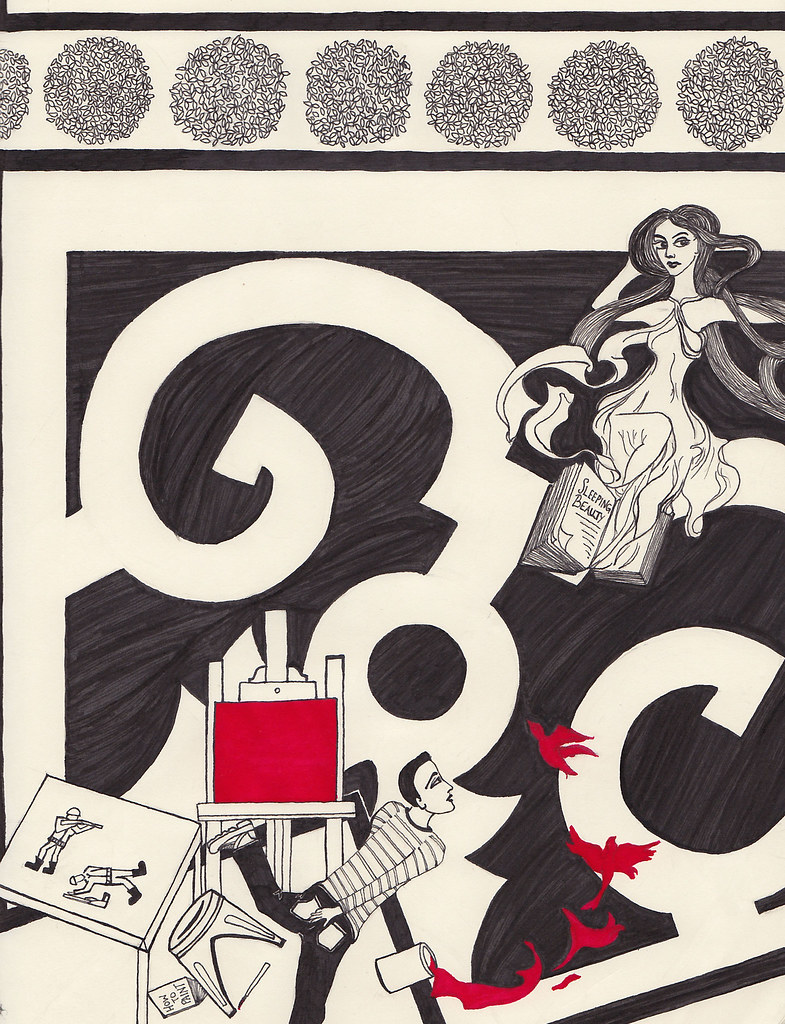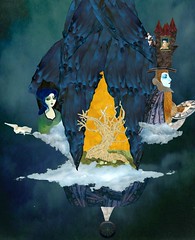“The fact is that every writer creates his own precursors. His work modifies our conception of the past, as it will modify the future.”—Borges, in his essay “Kafka and his Precursors.”

Borges, photo by Paola Agosti
Today is the 112th birthday of Jorge Luis Borges. He grew up in a house of books, played with his sister and their shared imaginary friends in the hallways of libraries and pathways of gardens, and spoke Spanish and English so interchangeably that he recalls being well-along in childhood before he understood that they were separate languages. (http://www.sccs.swarthmore.edu/users/00/pwillen1/lit/index3.htm) He grew up in Argentina, Switzerland, and Spain, picking up more languages along the way. His first shy foray into the publishing world of poetry was in 1923, with a cover bearing a woodcut made by his sister Norah and the project financed by his father. And he gave it away “often surreptitiously, such as slipping copies into the pockets of editor’s overcoats!” (Ibid). By the 1930s, he was gaining recognition as a writer, but the economy was such that he needed a more dependable income, and so he began nine years of painful drudgery in a library, surrounded by colleagues with no interest in the books they catalogued.
Everything changed in 1938. His father died, and he himself hovered in a liminal world of fevered nightmare, wounded, infected, and hallucinating in the hospital for a month. He awoke terrified that this illness would have destroyed his creativity, and that terror drove him to focus and to take chances which soon resulted in Pierre Menard, Author of Don Quixote and Tlon, Uqbar, Orbis Tertius.

(Don Quixote, his image a map of his life, dreams, and memories, both completely false and imaginatively edited. Painting by Octavio Ocampo.)
He also wrote political essays, which landed him a promotion when Juan Peron rose to power: Inspector of Poultry and Rabbits in the Public Markets.” He deferred, commenting that “dictatorships foment subservience, dictatorships foment cruelty; even more abominable is the fact that they foment stupidity. To fight against those sad monotonies is one of the many duties of writers.” (Ibid).
Tlon, Uqbar, Orbis Tertius is a fantastic example of how.
TLON, UQBAR, ORBIS TERTIUS
“For one of those gnostics, the visible universe was an illusion or (more precisely) a sophism.”
In the first part of this story, the narrator stumbles upon his first hint of the existence of Uqbar, a country to whom 4 pages in some exemplars of a particular encyclopedia are given, though no other proof of its presence in the world seems obtainable. He describes the confusion created by this discovery, as he searches through atlases, news articles and other encyclopedias for any mention of the land named Uqbar. And he gives the highlights of what he learns from those four strange, solitary pages.
“The section on Language and Literature was brief. Only one trait is worthy of recollection: it noted that the literature of Uqbar was one of fantasy and that its epics and legends never referred to reality, but to the two imaginary regions of Mlejnas and Tlön...”
In the second part, the narrator discovers, entirely by chance, a copy of the Hlaer to Jangr volume of the First Encyclopedia of Tlön:
“Two years before I had discovered, in a volume of a certain pirated encyclopedia, a superficial description of a nonexistent country; now chance afforded me something more precious and arduous. Now I held in my hands a vast methodical fragment of an unknown planet's entire history, with its architecture and its playing cards, with the dread of its mythologies and the murmur of its languages, with its emperors and its seas, with its minerals and its birds and its fish, with its algebra and its fire, with its theological and metaphysical controversy. And all of it articulated, coherent, with no visible doctrinal intent or tone of parody.”
He, along with others who have now stumbled upon these oddities, are convinced that no less than a team of “tlönistas” must be out there, creating the history, geography, poetry, art, architecture, mathematics, etc of this imaginary planet—one person would not suffice. The breadth of “knowledge” about the place is too much.
He says: “At first it was believed that Tlön was a mere chaos, and irresponsible license of the imagination; now it is known that is a cosmos and that the intimate laws which govern it have been formulated, at least provisionally.”
He then goes on to describe the language of the southern hemisphere of Tlön and extends directly from that language to everything else about it: existence upon it, the belief systems, the essence of its people:
“The nations of this planet are congenitally idealist. Their language and the derivations of their language - religion, letters, metaphysics [emphasis mine]- all presuppose idealism. The world for them is not a concourse of objects in space; it is a heterogeneous series of independent acts. It is successive and temporal, not spatial. There are no nouns in Tlön's conjectural Ursprache, from which the "present" languages and the dialects are derived: there are impersonal verbs, modified by monosyllabic suffixes (or prefixes) with an adverbial value. For example: there is no word corresponding to the word "moon,", but there is a verb which in English would be "to moon" or "to moonate." "The moon rose above the river" is hlor u fang axaxaxas mlo, or literally: "upward behind the onstreaming it mooned."”
What does this mean? What does it mean to say that there are no nouns, that everything is a verb? We can understand, if we speak this way, that the entire world is an act of creation, that we are not describing, but creating, that nothing simply is, it lives. What is a rock? To us, it is a thing. But if it can be described only using verbs, then we must understand that it exists for a purpose; it has its own existence, and without that purpose, it would not be. This makes me think of lucid dreaming, and—wait for it—Ars Memoria. If you were to fully analyze a scene in a dream, you would be thinking of the symbolic value of each object in the room or the landscape—the table, the chairs, the stain on the wall, the rock beside the path you were taking that you barely looked at. Why are those things there, in the dream? Your mind created them—each item, each speck on each item was created, intentionally. (The pipe is not just a pipe.) And if we were to say that the same is true of everything we see when waking? That would be part of the practice of Ars Memoria: to see the many possible meanings and links from each object and event to another, in order to better understand everything (thus memory is no issue) and eventually, to be able to affect those things through the mind. Don’t like the rock? The rock disappears. Poof.
The language of the northern hemisphere is different. There are only monosyllabic adjectives there, and a thing or an event is “named” by some combination of those adjectives. This means, in reality, that most things and events can only be described in a particular way once—thus, every moment of life is its own. There’s no such thing as a sunset, there is only the particular one that you are describing:
“There are objects composed of two terms, one of visual and another of auditory character: the color of the rising sun and the faraway cry of a bird. There are objects of many terms: the sun and the water on a swimmer's chest, the vague tremulous rose color we see with our eyes closed, the sensation of being carried along by a river and also by sleep. These second-degree objects can be combined with others; through the use of certain abbreviations, the process is practically infinite. There are famous poems made up of one enormous word. This word forms a poetic object created by the author.”
And then, Borges drops this bomb: “They know that a system is nothing more than the subordination of all aspects of the universe to any one such aspect.” This subordination is exactly what he has been describing. It is not merely a linguistic subordination of all words to the category “verb.” It is the subordination of every thought to that system of linguistic delivery. And stop for a moment to think about what this means if one spends all day making simplistic, vague sentences composed of infantile vocabulary, especially in the service of spreading scandals so common that their descriptions are merely fill-in-the-name-of-the-scandalizer forms.
Back to the story, we can see how language then affects math, which is still yet an expression of their beliefs: “maintain that the operation of counting modifies the quantities and converts them from indefinite into definite sums. The fact that several individuals who count the same quantity would obtain the same result is, for the psychologists, an example of association of ideas or of a good exercise of memory, “ and also: “The basis of visual geometry is the surface, not the point. This geometry disregards parallel lines and declares that man in his movement modifies the forms which surround him.”
Let’s hope so. But more than hoping, let us be purposeful in our movements.
Then there is a postscript. The narrator uneasily recounts the events that have occurred more recently and the massive changes they have brought to society. The action really begins when some princess receives an expected package, and one of the items inside is an unknown element: a compass, and on it is inscribed something in a language of Tlön. “Such was the first intrusion of this fantastic world into the world of reality.”
Suddenly, the world is inundated with information from this once-unreal planet. And then…:
“Almost immediately, reality yielded on more than one account. The truth is that it longed to yield. Ten years ago any symmetry with a resemblance of order - dialectical materialism, anti-Semitism, Nazism - was sufficient to entrance the minds of men. How could one do other than submit to Tlön, to the minute and vast evidence of an orderly planet?”
It isn’t that this is a foreign activity to us. It isn’t foreign at all. Not just the terrifying sweep of Nazism, but the very vast and detailed world which we claim to see in front of us right this minute could be no more than a dream, a perception, an organization of countless, teeming atoms into shapes and acts based on nothing more than a single (yet complex) belief--that Central Image I keep rambling about here. So, if the nightly news makes you sick to your stomach, maybe…
We could write another story. Draw a different picture.
The story is free to read and extremely highly recommended and linked HERE (English is on one side and Spanish is on the other; this is where I got the English quoted above.)
















